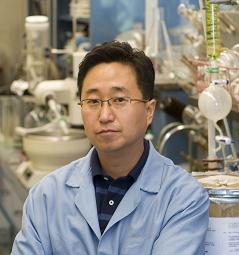KiBum Lee, Ph.D.
KiBum Lee is a distinguished professor of Chemistry and Chemical Biology at Rutgers University, where he has been a faculty since 2008. He received his Ph.D. in Chemistry from Northwestern University (with Chad A. Mirkin; 2004) and completed his postdoctoral training at The Scripps Research Institute (with Peter G. Schultz; 2007) respectively. The primary research interest of his group is to develop and integrate nanotechnologies and chemical biology to modulate signaling pathways in stem cells and cancer cells towards specific cell lineages or behaviors. In particular, his group is exploring critical problems in cancer research and stem cell biology pertaining to the cell-microenvironmental interactions, and how to control these interactions at the subcellular and single-cell level using interdisciplinary as well as transformative approaches. From this research effort, he has developed innovative technology platforms that may overcome the critical barriers to harnessing the full therapeutic potential of stem cells and cellular reprogramming.
Addressing the aforementioned issues, his group (https://kblee.rutgers.edu/) has recently focused on developing a variety of innovative technologies based upon nanobiotechnology and chemical biology to selectively control the fate of stem cells [e.g., human pluripotent stem cells (PSCs; hESCs and hiPSCs), Neural Stem Cells (NSCs), and Mesenchymal Stem Cells (MSCs)] towards specific cell lineages (e.g., neurons, oligodendrocytes, chondrocytes, muscles, osteocytes, and adipocytes) [Chemical Reviews, 2015; Nature Chemical Biology, 2015; Accounts of Chemical Research, 2016; Nature Communications, 2018; Small, 2021(I & II); Small Method, 2021; Advanced Materials, 2018, 2019, 2020 (I & II), 2021; Advanced Functional Materials, 2020, 2021]. Multi-modal magnetic core-shell nanoparticles have also been used to effectively deliver genetic materials into NSCs using a magnetic-filed-facilitated delivery method and to advance stem cell therapies (Angewandte. Chem. Int. Ed., 2013; Biomaterials,2016; Nano Letters, 2019, 2020). Substrates containing arrays of graphene-nanoparticle hybrids were also generatedto control and investigate the NSC and MSC differentiation into neurons and the subsequent alignment of axons (Advanced Materials, 2014, 2015, 2019; ACS Nano, 2016; Nature Comm, 2018). With the goal of achieving an enhanced stem cell-based therapy for CNS-related injuries and diseases, his group is currently designing nanomaterial-based 3D-scaffolds and spheroids/organoids to enhance cellular viability and to modulate NSC differentiation spatiotemporally (Advanced Materials, 2014, 2020, 2021; Nature Comm, 2018; Science Advances,2021). Realizing the motivation to develop a highly robust, efficient nanoparticle-based platform to regulate gene expression and eventually stem cell reprogramming, his group has developed the NanoScript as the first nanomaterial Transcription Factor (TF) protein that can interact with endogenous DNA and control stem cell differentiation to generate functional cell lineages such as cartilage, bone, muscle cells, and neuronal cells (ACS Nano, 2014; J. Am. Chem. Soc., 2015; ACS Nano, 2015; Angewandte Chemie, 2015).
In recognition of his outstanding scientific achievement at Rutgers, Dr. Lee has received several awards, including NIH Director’s New Innovator Awards (2009), Japan Society for the Promotion of Science (JSPS) Fellowship (2017), Alzheimer’s Association Research Grant- New to the Field (2021), American Chemical Society New Directions (ND) Award (2015), The University City Science Center’s QED Award (2016), Board of Trustees Research Award for Scholarly Excellence (2013), Burroughs Wellcome Fund Collaborative Research Grant Award (2014), Grossman Innovation Prize (2021), Busch Biomedical Grant Award (2013), New Jersey Spinal Cord Research Award (2009, 2013, 2016, 2017), Johnson and Johnson Proof-of-Concept Award (2011). He has presented this research works (invited and plenary seminars) at many conferences, institutes, universities and symposiums (~200). He is the first author, co-author, and corresponding author of approximately 100 articles published in high-profile journals, including Science, Science Advances, Cell Stem Cell, Nature Chemical Biology, Nature Communications, J. Am. Chem. Soc., Angew. Chem, Int. Ed., Nano Letters, ACS Nano, Advanced Materials, Accounts of Chemical Research, Chemical Reviews, Biomaterials Scientific Reports, Lab Chip, Small, Biomaterials, Nanomedicine, and Cancer Research, which are highly cited (>11,000). [Total 117 publications, >11,000 citations, h-index: ~50; 36 Patents/applications]
Contact Info
- Office: Chemistry and Chemical Biology. Room 3312
- Email: kblee (at) rutgers.edu
- Phone: 848-445-2081
Academic Position
- Distinguished Professor, Dept. of Chemistry and Chemical Biology, Rutgers University
Affiliation
- Biomedical Engineering Dept. Graduate Program
- Graduate Program in Molecular Biosciences
- The Rutgers Stem Cell Research Center
- Human Genetics Institute of New Jersey
- Rutgers Brain Health Institute
- New Jersey Center for Biomaterials (RUNEG)
- Center for Integrative Proteomics Research
- Quantitative Biomedicine Graduate Program
- Cancer Institute of New Jersey (Full Member)
- Chemical and Biochemical Engineering Dept.

